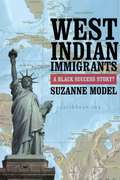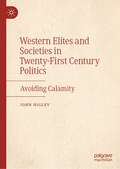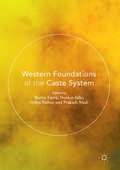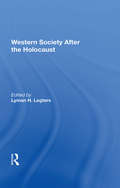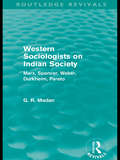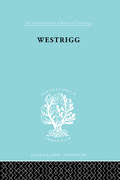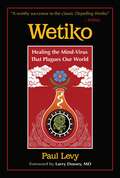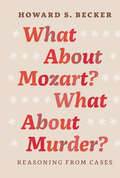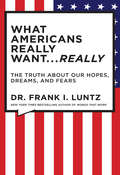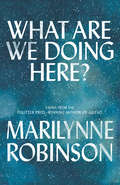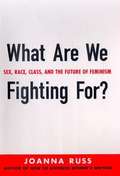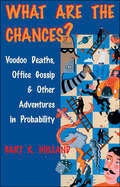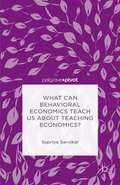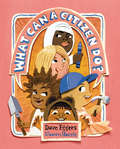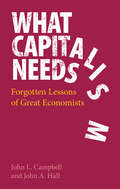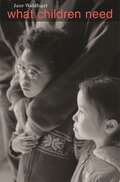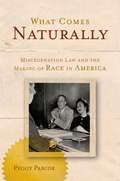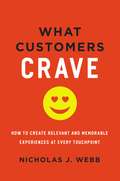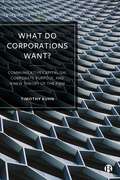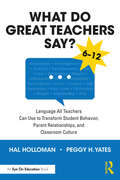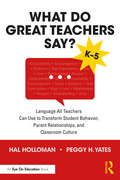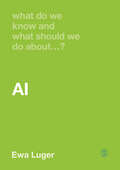- Table View
- List View
West Indian Immigrants: A Black Success Story?
by Suzanne ModelWest Indian immigrants to the United States fare better than native-born African Americans on a wide array of economic measures, including labor force participation, earnings, and occupational prestige. Some researchers argue that the root of this difference lies in differing cultural attitudes toward work, while others maintain that white Americans favor West Indian blacks over African Americans, giving them an edge in the workforce. Still others hold that West Indians who emigrate to this country are more ambitious and talented than those they left behind. In West Indian Immigrants, sociologist Suzanne Model subjects these theories to close historical and empirical scrutiny to unravel the mystery of West Indian success. West Indian Immigrants draws on four decades of national census data, surveys of Caribbean emigrants around the world, and historical records dating back to the emergence of the slave trade. Model debunks the notion that growing up in an all-black society is an advantage by showing that immigrants from racially homogeneous and racially heterogeneous areas have identical economic outcomes. Weighing the evidence for white American favoritism, Model compares West Indian immigrants in New York, Toronto, London, and Amsterdam, and finds that, despite variation in the labor markets and ethnic composition of these cities, Caribbean immigrants in these four cities attain similar levels of economic success. Model also looks at "movers" and "stayers" from Barbados, Jamaica, Trinidad, and Guyana, and finds that emigrants leaving all four countries have more education and hold higher status jobs than those who remain. In this sense, West Indians immigrants are not so different from successful native-born African Americans who have moved within the U.S. to further their careers. Both West Indian immigrants and native-born African-American movers are the "best and the brightest"—they are more literate and hold better jobs than those who stay put. While political debates about the nature of black disadvantage in America have long fixated on West Indians' relatively favorable economic position, this crucial finding reveals a fundamental flaw in the argument that West Indian success is proof of native-born blacks' behavioral shortcomings. Proponents of this viewpoint have overlooked the critical role of immigrant self-selection. West Indian Immigrants is a sweeping historical narrative and definitive empirical analysis that promises to change the way we think about what it means to be a black American. Ultimately, Model shows that West Indians aren't a black success story at all—rather, they are an immigrant success story.
West-Bloc Dissident: A Cold War Memoir
by William BlumA highly personal and candid memoir by a former U.S. State Department employee who became a radical dissident in the 1960s and remains active in opposing U.S. imperialism
Western Elites and Societies in Twenty-First Century Politics: Avoiding Calamity
by John HigleyThis book focuses on threats to the continued viability of Western institutions and practices for which it is not easy to conceive remedies consistent with the Western tradition. Higley argues that structural difficulties in postindustrial societies, particularly the United States, the United Kingdom, France, and elsewhere, threatened troubles that political manipulation by elites might not be sufficient to contain or resolve. Struggling against lethal climate change, politically explosive waves of migrants and refugees, the likelihood of further pandemics, populist nationalism, and destabilizing effects of social media, elites must consider new demographic, economic, social, political, and international policies. Higley offers a powerful and provocative analysis of the elite’s ability to sustain Western societies in their current social and political forms.
Western Foundations of the Caste System
by Martin Fárek, Dunkin Jalki, Sufiya Pathan and Prakash ShahThis book argues that the dominant descriptions of the ‘caste system’ are rooted in the Western Christian experience of India. Thus, caste studies tell us more about the West than about India. It further demonstrates the imperative to move beyond this scholarship in order to generate descriptions of Indian social reality. The dominant descriptions of the ‘caste system’ that we have today are results of originally Christian themes and questions. The authors of this collection show how this hypothesis can be applied beyond South Asia to the diasporic cultures that have made a home in Western countries, and how the inheritance of caste studies as structured by European scholarship impacts on our understanding of contemporary India and the Indians of the diaspora. This collection will be of interest to scholars and students of caste studies, India studies, religion in South Asia, postcolonial studies, history, anthropology and sociology.
Western Society After The Holocaust
by Lyman H. LegtersBased on an International Scholars' Symposium convened to recall the infamous Kristallnacht in Hitler's Germany, this book represents an effort to distill from the ensuing Holocaust experience the lessons that seem most applicable to the contemporary world.
Western Sociologists on Indian Society: Marx, Spencer, Weber, Durkheim, Pareto (Routledge Revivals)
by G. R. MadanOf the five major sociologists whose views on Indian society are assessed in this work, originally published in 1979, Marx and Weber made a special study of the subject and had something definite to say about the future of Indian society. Herbert Spencer was primarily concerned with the effects of colonial rule on India’s progress, while Durkheim and Pareto tended to observe Indian society from a comparative point of view. However, as this study shows, all five sociologists touched on two special aspects of Indian society – Indian religion and the caste system. The other features of Indian society which they discussed in their various writings range widely from marriage and family structure, through village communities and the social structure of cities, to political organization, the educational system, economic conditions, and the future progress of Indian society. Dr Madan demonstrates the correctness of Marx’s contention that the political subordination of India was the one great hindrance to the future progress of Indian Society. He points out, though, that Marx failed to see clearly the effects of the caste system on economic development, and shows that this aspect was more correctly assessed by Max Weber. On the other hand, in Dr Madan’s view, Weber’s observation that Indian religion was ‘other-worldly’ and therefore a great obstacle to progress in Indian society lacked incisiveness. By focusing on a neglected aspect of the writings of five of the great figures in sociology, the book gives a new insight into their work, and at the same time highlights many hitherto unrecognized facets of India’s complex social structure.
Westrigg:Soc Cheviot Ils 180 (International Library of Sociology)
by James LittlejohnFirst Published in 1998. Routledge is an imprint of Taylor & Francis, an informa company.
Wetiko: Healing the Mind-Virus That Plagues Our World
by Paul Levy• Explores how wetiko covertly operates both out in the world and within our minds and how it underlies every form of self-destruction, both individual and collective • Reveals how wetiko&’s power lies in our blindness to it and examines how people across the ages have symbolized wetiko to help see it and heal it • Examines the concept of wetiko as it appears in the teachings of the Kabbalah, Hawaiian Kahuna shamanism, mystical Christianity, and the work of C. G. Jung In its Native American meaning, wetiko is an evil cannibalistic spirit that can take over people&’s minds, leading to selfishness, insatiable greed, and consumption as an end in itself, destructively turning our intrinsic creative genius against our own humanity. Revealing the presence of wetiko in our modern world behind every form of destruction our species is carrying out, both individual and collective, Paul Levy shows how this mind-virus is so embedded in our psyches that it is almost undetectable--and it is our blindness to it that gives wetiko its power. Yet, as Levy reveals in striking detail, by recognizing this highly contagious mind parasite, by seeing wetiko, we can break free from its hold and realize the vast creative powers of the human mind. Levy explores how artists, philosophers, and spiritual traditions across the ages have been creatively symbolizing this deadly pathogen of the psyche so as to help us see it and heal it. He examines the concept of wetiko as it appears in the teachings of the Kabbalah, Hawaiian Kahuna shamanism, Buddhism, and mystical Christianity and through esoteric concepts like egregores, demons, counterfeiting spirits, and psychic vampires. He reveals how visionary thinkers such as C. G. Jung, Sri Aurobindo, Philip K. Dick, Colin Wilson, Nicolas Berdyaev, and Rene Girard each point to wetiko in their own unique and creative way. He explores how the projection of the shadow self--scapegoating--is the underlying psychological mechanism fueling wetiko and examines wetiko in the context of the Covid-19 pandemic, showing that we can reframe the pandemic so as to receive the lessons and opportunities embedded in it. Revealing how the power of imagination can cure the wetiko mind-virus, Levy underscores how important it is for each of us to bring forth the creative spirit within us, which helps shed the light of consciousness on wetiko, taking away its power over us while simultaneously empowering ourselves.
What About Mozart? What About Murder?: Reasoning From Cases
by Howard S. BeckerIn 1963, Howard S. Becker gave a lecture about deviance, challenging the then-conventional definition that deviance was inherently criminal and abnormal and arguing that instead, deviance was better understood as a function of labeling. At the end of his lecture, a distinguished colleague standing at the back of the room, puffing a cigar, looked at Becker quizzically and asked, “What about murder? Isn’t that really deviant?” It sounded like Becker had been backed into a corner. Becker, however, wasn’t defeated! Reasonable people, he countered, differ over whether certain killings are murder or justified homicide, and these differences vary depending on what kinds of people did the killing. In What About Mozart? What About Murder?, Becker uses this example, along with many others, to demonstrate the different ways to study society, one that uses carefully investigated, specific cases and another that relies on speculation and on what he calls “killer questions,” aimed at taking down an opponent by citing invented cases. Becker draws on a lifetime of sociological research and wisdom to show, in helpful detail, how to use a variety of kinds of cases to build sociological knowledge. With his trademark conversational flair and informal, personal perspective Becker provides a guide that researchers can use to produce general sociological knowledge through case studies. He champions research that has enough data to go beyond guesswork and urges researchers to avoid what he calls “skeleton cases,” which use fictional stories that pose as scientific evidence. Using his long career as a backdrop, Becker delivers a winning book that will surely change the way scholars in many fields approach their research.
What Americans Really Want...Really: The Truth About Our Hopes, Dreams, and Fears
by Frank I. LuntzNo one in America has done more observing of more people than Dr. Frank I. Luntz. From Bill O'Reilly to Bill Maher, America's leading pundits, prognosticators, and CEOs turn to Luntz to explain the present and to predict the future. With all the upheavals of recent events, the plans and priorities of the American people have undergone a seismic shift. Businesses everywhere are trying to market products and services during this turbulent time, but only one man really understands the needs and desires of the New America. From restaurant booths to voting booths, Luntz has watched and assessed our private habits, our public interests, and our hopes and fears. What are the five things Americans want the most? What do they really want in their daily lives? In their jobs? From their government? For their families? And how does understanding what Americans want allow businesses to thrive? Luntz disassembles the preconceived notions we have about one another and lays all the pieces of the American condition out in front of us, openly and honestly, then puts the pieces back together in a way that reflects the society in which we live. What Americans Really Want...Really is a real, if sometimes scary, discussion of Americans' secret hopes, fears, wants, and needs. The research in this book represents a decade of face-to-face interviews with twenty-five thousand people and telephone polls with one million more, as well as the exclusive, first-ever "What Americans Really Want" survey. What Luntz offers is a glimpse into the American psyche, along with analysis that will rock assumptions and right business judgment. He proves that success in virtually any profession demands that we either understand what Americans really want, or suffer the consequences.
What Are We Doing Here?: Essays
by Marilynne RobinsonNew essays on theological, political, and contemporary themes, by the Pulitzer Prize winner.Marilynne Robinson has plumbed the human spirit in her renowned novels, including Lila, winner of the National Book Critics Circle Award, and Gilead, winner of the Pulitzer Prize and the National Book Critics Circle Award. In this new essay collection she trains her incisive mind on our modern political climate and the mysteries of faith. Whether she is investigating how the work of great thinkers about America like Emerson and Tocqueville inform our political consciousness or discussing the way that beauty informs and disciplines daily life, Robinson's peerless prose and boundless humanity are on full display. What Are We Doing Here? is a call for Americans to continue the tradition of those great thinkers and to remake political and cultural life as "deeply impressed by obligation [and as] a great theater of heroic generosity, which, despite all, is sometimes palpable still."
What Are We Fighting For?: Sex, Race, Class and the Future of Feminism
by Joanna RussA study of the future of feminism calls for a return to the radical roots of feminism's direct political struggle during the 1960s and early 1970s and a move away from the de-politicized focus on women's psychology and personal relations of today.
What Are the Chances?: Voodoo Deaths, Office Gossip, and Other Adventures in Probability
by Bart K. HollandUsing examples drawn from daily life and history, the author explains what probability is and how it works.Our lives are governed by chance. But what, exactly, is chance? In this book, accomplished statistician and storyteller Bart K. Holland takes us on a tour of the world of probability. Weaving together tales from real life—from the spread of the bubonic plague in medieval Europe or the number of Prussian cavalrymen kicked to death by their horses, through IQ test results and deaths by voodoo curse, to why you have to wait in line for rides at Disneyworld—Holland captures the reader's imagination with surprising examples of probability in action, everyday events that can profoundly affect our lives but are controlled by just one number.As Holland explains, even chance events are governed by the laws of probability and follow regular patterns called statistical laws. He shows how such laws are successfully applied, with great benefit, in fields as diverse as the insurance industry, the legal system, medical research, aerospace engineering, and climatology. Whether you have only a distant recollection of high school algebra or use differential equations every day, this book offers examples of the impact of chance that will amuse and astonish.
What Can Behavioral Economics Teach Us about Teaching Economics?
by Supriya SarnikarSarnikar cites evidence of frequent misconceptions of economics amongst students, graduates, and even some economists, and argues that behavioral economists are uniquely qualified to investigate causes of poor learning in economics. She conducts a review of the economics education literature to identify gaps in current research efforts and suggests a two-pronged approach to fill the gaps: an engineering approach to the adoption of innovative teaching methods and a new research program to enhance economists' understanding of how learning occurs. To facilitate research into learning processes, Sarnikar provides an overview of selected learning theories from psychology, as well as new data on hidden misconceptions amongst beginning students of economics. She argues that if they ask the right questions, economists of all persuasions are likely to find surprising lessons in the answers of beginning students of economics.
What Can a Citizen Do?
by Dave Eggers Shawn HarrisA citizen can pick up litterA citizen can pull a weedA citizen can help that critterA citizen can plant a seedA citizen can aid a neighbor A citizen can join a causeA citizen can write a letterA citizen can help change laws . . .Empowering and timeless, What Can a Citizen Do? is the latest collaboration from the acclaimed duo behind the bestselling Her Right Foot: Dave Eggers and Shawn Harris. This is a book for today's youth about what it means to be a citizen.Across the course of several seemingly unrelated but ultimately connected actions by different children, we watch how kids turn a lonely island into a community—and watch a journey from what the world should be to what the world could be.This is a book about what citizenship—good citizenship—means to you, and to us all.
What Capitalism Needs: Forgotten Lessons of Great Economists
by John A. Hall John L. CampbellFrom unemployment to Brexit to climate change, capitalism is in trouble and ill-prepared to cope with the challenges of the coming decades. How did we get here? While contemporary economists and policymakers tend to ignore the political and social dimensions of capitalism, some of the great economists of the past - Adam Smith, Friedrich List, John Maynard Keynes, Joseph Schumpeter, Karl Polanyi and Albert Hirschman - did not make the same mistake. Leveraging their insights, sociologists John L. Campbell and John A. Hall trace the historical development of capitalism as a social, political, and economic system throughout the twentieth and early twenty-first centuries. They draw comparisons across eras and around the globe to show that there is no inevitable logic of capitalism. Rather, capitalism's performance depends on the strength of nation-states, the social cohesion of capitalist societies, and the stability of the international system - three things that are in short supply today.
What Children Need
by Jane WaldfogelWhat do children need to grow and develop? And how can their needs be met when parents work? Emphasizing the importance of parental choice, quality of care, and work opportunities, economist Jane Waldfogel guides readers through the maze of social science research evidence to offer comprehensive answers and a vision for change. Drawing on the evidence, Waldfogel proposes a bold new plan to better meet the needs of children in working families, from birth through adolescence, while respecting the core values of choice, quality, and work: ,Allow parents more flexibility to take time off work for family responsibilities; ,Break the link between employment and essential family benefits; ,Give mothers and fathers more options to stay home in the first year of life; ,Improve quality of care from infancy through the preschool years; ,Increase access to high-quality out-of-school programs for school-aged children and teenagers.
What Comes Naturally: Miscegenation Law And The Making Of Race In America
by Peggy PascoeA long-awaited history that promises to dramatically change our understanding of race in America, What Comes Naturally traces the origins, spread, and demise of miscegenation laws in the United States-laws that banned interracial marriage and sex, and which were enacted and applied not just in the South but throughout most of the country, in the West, the North, and the Midwest. Beginning in the Reconstruction era, when the term miscegenation first was coined, Peggy Pascoe traces the creation of a racial hierarchy that bolstered white supremacy and banned the marriage of Whites to Chinese, Japanese, Filipinos, and American Indians, as well as the marriage of Whites to Blacks. She takes readers into the lost world of miscegenation law, showing how legislators, lawyers, and judges used ideas about gender and sexuality to enact and enforce miscegenation laws. Judges labeled interracial marriages "unnatural," marriage license clerks made them seem statistically invisible, and newspaper reporters turned them into sensational morality tales. Taken together, their actions embedded a multiracial version of white supremacy deep in the heart of the modern American state. Pascoe ends not simply with the landmark 1967 case of Loving v. Virginia, in which the U. S. Supreme Court finally struck down miscegenation laws, but with a look at the implications of the ideal of colorblindness that replaced them. Moving effortlessly from the lives of interracial couples, the politicking of the NAACP, and the outraged objections of Filipino immigrants to the halls of state legislatures and rulings of the Supreme Court, What Comes Naturally transcends older interpretations of bans on interracial marriage as a southern story in black and white to offer a stunning account of the national scope and multiracial breadth of America's tragic history of miscegenation laws.
What Customers Crave: How to Create Relevant and Memorable Experiences at Every Touchpoint
by Nicholas WebbThink you know your customers? You better be more assured than just thinking you do, because your success depends on it! The best companies in the world first research exhaustively what their customers desire, and then they deliver it in memorable and deeply human experiences--resulting in success previously believed to be unachievable. So once again, how well do you know your customers?In a hyperconnected economy that is radically changing consumer expectations, this vital expectation for any successful business is not always easy. But in What Customers Crave, author and business strategist Nicholas Webb simplifies this critical task into being able to confidently answer two questions: What do your customers love? What do they hate?Jam-packed with tools and examples, this must-have resource helps businesses reinvent how they engage with customers (both physical and virtual). Learn how to:• Gain invaluable insights into who your customers are and what they care about• Use listening posts and Contact Point Innovation to refine customer types• Engineer experiences for each micromarket that are not only exceptional, but insanely relevant• Connect across the five most important touchpoints• Co-create with your customers• And more!It’s time to reinvent the ways you engage with your customers. Because when you learn to provide for them exactly what they want, they not only bring along their wallets but those belong to their friends as well!
What Do Corporations Want?: Communicative Capitalism, Corporate Purpose, and a New Theory of the Firm
by Timothy Kuhn'Corporate purpose' has become a battleground for stakeholders’ competing desires. Some argue that corporations must simply generate profit; others suggest that we must make them create social change.Leading organization studies scholar Timothy Kuhn argues that this 'either/or' thinking dramatically oversimplifies matters: today’s corporations must be many things, all at once.Kuhn offers a bold new Communicative Theory of the Firm to highlight the authority that creates corporations’ identities and activities. The theory provides a roadmap for navigating that battleground of competing desires to produce more responsive corporations.Drawing on communicative and new materialist theorizing, along with three insightful case studies, this book thoroughly redefines our understandings of what corporations are 'for'.
What Do Great Teachers Say?: Language All Teachers Can Use to Transform Student Behavior, Parent Relationships, and Classroom Culture 6-12
by Hal Holloman Peggy H. YatesDo you remember a time when you used the right words at the right moment, and they made all the difference? With the aim of helping you repeat that experience every day, this book provides hundreds of examples of what we call Great Teacher Language, a technique designed to help all teachers use words to transform student behavior and parent relationships. In their years of working at the K-12 levels, educators Hal Holloman and Peggy H. Yates have identified the exact phrases and key words you can use in your classroom to address inappropriate outbursts, a lack of respect and cooperation, student conflict, and more. Great Teacher Language will enable you to transform student behavior, parent relationships, and your classroom culture.The book features 11 Great Teacher Language Word Categories, which you'll learn how to use in terms of self-talk, student talk, and parent talk: Words of Accountability, Words of Encouragement, Words of Grace, Words of Guidance, Words of High Expectations, Words of Hope, Words of Love, Words of Relationships, Words of Respect, Words of Understanding, and Words of Unity.Filled with helpful charts and Great Teacher Language examples, this resource will be one you turn to again and again and will make a transformational difference for your middle and high school students, their parents, and you!
What Do Great Teachers Say?: Language All Teachers Can Use to Transform Student Behavior, Parent Relationships, and Classroom Culture K-5
by Hal Holloman Peggy H. YatesDo you remember a time when you used the right words at the right moment, and they made all the difference? With the aim of helping you repeat that experience every day, this book provides hundreds of examples of what we call Great Teacher Language, a technique designed to help all teachers use words to transform student behavior and parent relationships. In their years of working at the K-12 levels, educators Hal Holloman and Peggy H. Yates have identified the exact phrases and key words you can use in your classroom to address inappropriate outbursts, a lack of respect and cooperation, student conflict, and more. Great Teacher Language will enable you to transform student behavior, parent relationships, and your classroom culture. This book features 11 Great Teacher Language Word Categories, which you'll learn how to use in terms of self-talk, student talk, and parent talk: Words of Accountability, Words of Encouragement, Words of Grace, Words of Guidance, Words of High Expectations, Words of Hope, Words of Love, Words of Relationships, Words of Respect, Words of Understanding, and Words of Unity. Filled with helpful charts and Great Teacher Language examples, this resource will be one you turn to again and again, and will make a transformational difference for your students, your parents, and you!
What Do Needle and Syringe Programs Do?: An Assemblic Account of Staff-Client Relationships at Needle Syringe Programs
by Ken YatesThis book explores the lived experiences of people who interact with needle and syringe program services in Western Sydney, Australia, including participants and industry workers. It locates the research within the wider context of harm reduction and drug policies. It addresses the question "what do needle and syringe programs do?" and seeks to unpack the agency of human and non-human factors to consider the ‘more than human’ effects of these programmes. Alongside a critical materialist perspective used to interpret the empirical findings, the book demonstrates that needle and syringe programs create new possibilities for engaging with the world by changing the material conditions of illicit drug consumption. It draws on the conceptual contributions of post-humanist thinking from assemblage theory, actor-network theory, and cognate scholarship. Consideration is given to transferable findings and insights for international contexts. The book speaks to scholars and postgraduate students in the areas such as sociology, criminology, social work, critical public health, cultural studies, and related fields.
What Do We Know and What Should We Do About AI? (What Do We Know and What Should We Do About:)
by Ewa LugerThe idea of Artificial Intelligence (AI) has taken the world by storm. From fears over killer robots in sci-fi dystopias, to driverless cars in real life, we are both inspired and horrified by the prospect of an advanced intelligence that is not our own. Could AI take over the world? Will it take all of our jobs? Has Google really created a sentient chatbot, and is AI racing towards human intelligence, or is it just horribly misunderstood? These common questions point us towards an unknown and troubling future. What we do know is that we are in the midst of a hype cycle, with huge amounts of funding and focus galvanising progress. Whether AI truly lives up to this hype remains to be seen, but this once niche idea has suddenly evolved into a global multibillion dollar industry. In this short and accessible book, Ewa Luger explains what we mean when we talk about AI, explores how we got here, describes what we are doing about it, where the field is heading, and where we should go next. Written by leading social scientists, the What Do We Know and What Should We Do About...? series offers concise, up-to-date overviews of issues often oversimplified, misrepresented or misunderstood and shows you how to enact change. "Short, sharp and compelling." - Alex Preston, The Observer "If you want to learn a lot about what matters most, in as short a time as possible, this is the series for you."- Danny Dorling, 1971 Professor of Geography, University of Oxford
What Do We Know and What Should We Do About AI? (What Do We Know and What Should We Do About:)
by Ewa LugerThe idea of Artificial Intelligence (AI) has taken the world by storm. From fears over killer robots in sci-fi dystopias, to driverless cars in real life, we are both inspired and horrified by the prospect of an advanced intelligence that is not our own. Could AI take over the world? Will it take all of our jobs? Has Google really created a sentient chatbot, and is AI racing towards human intelligence, or is it just horribly misunderstood? These common questions point us towards an unknown and troubling future. What we do know is that we are in the midst of a hype cycle, with huge amounts of funding and focus galvanising progress. Whether AI truly lives up to this hype remains to be seen, but this once niche idea has suddenly evolved into a global multibillion dollar industry. In this short and accessible book, Ewa Luger explains what we mean when we talk about AI, explores how we got here, describes what we are doing about it, where the field is heading, and where we should go next. Written by leading social scientists, the What Do We Know and What Should We Do About...? series offers concise, up-to-date overviews of issues often oversimplified, misrepresented or misunderstood and shows you how to enact change. "Short, sharp and compelling." - Alex Preston, The Observer "If you want to learn a lot about what matters most, in as short a time as possible, this is the series for you."- Danny Dorling, 1971 Professor of Geography, University of Oxford
